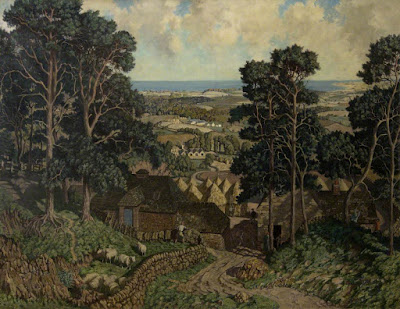Wet Evening in April
The birds sang in the wet trees
And as I listened to them it was a hundred years from now
And I was dead and someone else was listening to them.
But I was glad I had recorded for him the melancholy.
Patrick Kavanagh, Collected Poems (edited by Antoinette Quinn) (Penguin 2004). The poem was first published in Kavanagh's Weekly on April 19, 1952.
A small and beautiful thing. The less said, the better.
John Mitchell (1862-1922), "The Waterfoot, Carradale" (1921)
As I noted here a few years ago, I feel a sense of serenity when I contemplate the fact that the seasons will continue to come and go long after I have turned to dust.
Since late March I have been spending time with the poems in The Greek Anthology. Recently, I came across this:
The world is fleeting; all things pass away;
Or is it we that pass and they that stay?
Lucian (120-200 A. D.) (translated by Walter Leaf), in T. F. Higham and C. M. Bowra (editors), The Oxford Book of Greek Verse in Translation (Oxford University Press 1938).
In one of his notebooks, Samuel Taylor Coleridge writes:
"The quiet circle in which Change and Permanence co-exist, not by combination or juxtaposition, but by an absolute annihilation of difference/column of smoke, the fountains before St Peter's, waterfalls/God! -- Change without loss -- change by a perpetual growth, that [at] once constitutes & annihilates change. [T]he past, & the future included in the Present//oh! it is aweful."
Samuel Taylor Coleridge, notebook entry (April or May, 1806) in Kathleen Coburn (editor), The Notebooks of Samuel Taylor Coleridge, Volume 2: 1804-1808 (Pantheon Books 1961), Entry 2832.
The italics and the slashes appear in the original text. Given that Coleridge was in Italy at the time the entry was made, "the fountains before St Peter's" likely refers to the fountains in St Peter's Square in Rome. Coleridge's use of the spelling "aweful" was not uncommon in his time. The spelling provides a reminder that "awful" means "awe-inspiring," with one sense being "solemnly impressive; sublimely majestic." Oxford English Dictionary (Second Edition 1989). Of course, in our age the word usually means "causing dread; terrible, dreadful, appalling." Ibid. I am inclined to think that Coleridge was using "aweful" in the former sense. But this is only a guess.
For me, "Wet Evening in April" embodies a feeling of permanence in the midst of unceasing change. I know the melancholy of which Kavanagh speaks. We all do. As have all those who have come before us. As will all those who will come after as. The birds singing in the wet trees on an April evening accompany us all.
John Lawson (1868-1909), "An Ayrshire Stream" (1893)
But melancholy is not the whole of it. For instance, when it comes to the birds of April, and of spring, we should remember Ben Jonson's translation of a fragment of Sappho: "The dear good angel of the spring,/The nightingale." (Ben Jonson, The Sad Shepherd, Act II, Scene VI, in H. T. Wharton, Sappho: Memoir, Text, Selected Renderings and a Literal Translation (John Lane 1907), page 96.)
Kavanagh knows this as well. Thus, he brings us from April into May:
Consider the Grass Growing
Consider the grass growing
As it grew last year and the year before,
Cool about the ankles like summer rivers,
When we walked on a May evening through the meadows
To watch the mare that was going to foal.
Patrick Kavanagh, Collected Poems. The poem was first published in The Irish Press on May 21, 1943.
"Consider the grass growing/As it grew last year and the year before." Never-ending, with us or without us.
Mary Jane Girardot (1863-1933), "Evening Glow" (1900)







